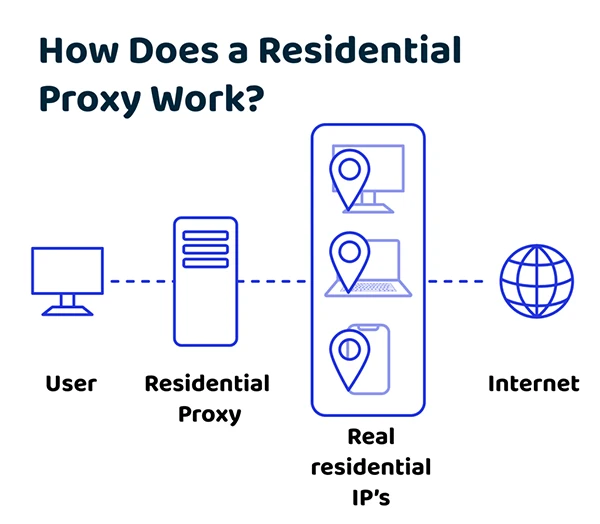Residential Proxy Online: Navigating the Web Anonymously
As the digital realm is highly dominated by data sharing and handling, residential proxies online are becoming an indispensable component of business and individual security while maintaining online anonymity.
However, there are various types of proxies in the market such as shared proxies, public proxies, and datacenter proxies, etc. Residential Proxies provide individuals with more anonymity online and a more competitive ground for businesses.
Residential proxies let you browse the web through the IPs of other people that are usually attached to physical locations.
But how do Residential Proxies work? Are they legal? And how to choose the correct one for you?
Let’s find out together
Understanding Residential Proxies
Residential proxies allow you to surf the web from a specific location (country, city, or mobile carrier) as a real user in that area. It’s an intermediary IP address borrowed from real user’s devices.
Residential proxies are issued by Internet Service Providers (ISPs) and not by a cloud hosting company, which separates them from datacenter proxies, further strengthening your online anonymity.
Similarly, an IP address is considered residential if it’s registered under an internet service provider that offers services such as Comcast in the US, Vodafone in the UK, or JIO in India.

The Legal and Ethical Landscape
After getting hold of what residential proxy is. The very next thing that may come to your mind is “Are Residential Proxy legal?“
The straightforward answer to this is yes, it is legal to use a Residential proxy. However, it depends on how you use it.
For example, using the residential proxies for legitimate use like web scraping, data collection, or bypassing the geo-restrictions for content access is usually legal.
But Using it for malicious activities such as hacking, fraud, or distributing copyrighted material is illegal for sure.
Did You Know?
Residential proxies can be segmented into 3 categories: cheap, mid-level, and premium. And the cheapest one costs 10 times less than the premium one.
Applications and Use Cases
Here are some of the common uses of Residential Proxies
- Market research: Businesses often use residential proxies to gather information regarding market trends and customer preferences, which helps them make informed decisions.
- Bypassing geo-restrictions: Residential proxies are also used to access the geo-restricted content.
- Ad verification: Companies use residential proxies to check if their ad campaign is being displayed as intended or not.
- Seo monitoring: Seo specialists use Residential proxies to check their website ranking from different locations.
- Online privacy: Internet users use residential proxies to mask their IP addresses which makes them untraceable.
- Quality assurance testing: Businesses often use residential proxies for the quality assurance of their website.
Choosing the Right Residential Proxy Service

One of the major things to consider in choosing the right residential proxy services because some of the providers lower the prices to attract customers and offer them a very low-quality internet speed.
Here are some of the factors to consider while choosing the right residential proxy services:
- Consistent Speed: read some of the reviews of the service provider to make sure they offer consistent speed.
- The Size of IP Pool: while choosing the right residential proxy it is important to have the possibility to rotate the IP address.
- Ease of Integration: Make sure that they offer a good support team that guides you on integrating their proxies.
- Ethical Approach: A trusted provider never sources the IP address of its user without their consent.
Risks and Limitations
Residential Proxies are best when it comes to maintaining your online anonymity. But it also has some limitations that you should be familiar with.
- Residential proxies are one of the most expensive proxy types because they need a physical device and a local ISP to verify the IP address.
- When compared to Data Centre proxies, residential proxies offer slow internet speed which makes it a tough choice for data-heavy tasks.
Future of Residential Proxies and Online Anonymity
As businesses and individuals become more aware of cybersecurity, the future for the residential proxies looks bright. However, the providers need to offer trust and ensure that their residential proxies are secure.
Additionally, the cost of the residential proxies needs to come down so that even small businesses can use it for their benefit.
Conclusion
To conclude, Residential Proxies are a valuable tool for cybersecurity purposes. However, they may be expensive and offer slower speed than the data center proxies but they never fail to provide top-notch security while masking your IP address and ensuring your online anonymity.
There you have it, your complete guide to Residential proxies, their legal landscape, applications, and tips on how to choose the right residential proxies for you. Hope it helps.
Also Read: A Comprehensive Insight Into Dolphin Proxy
Frequently Asked Questions
What is a Residential Proxy?
Residential proxies allow you to surf the web from a specific location (country, city, or mobile carrier) as a real user in that area. It belongs to a real mobile or desktop device that masks your IP address further ensuring your anonymity.
What’s the difference between Proxies and residential proxies?
Residential proxies belong to real individual users compensated by the network for their participation. On the other hand, data center proxies are cheaper options with lower performance.
Alt text: Difference between proxies and residential proxies
Why use a Residential Proxy?
Residential Proxy helps in bypassing CAPTCHAs, accessing geo-restricted websites, providing long-term stable residential IP addresses, and ensuring strong stability, reliability, and security.
Are Residential Proxy Legal?
The use of Residential proxies is entirely legal. However, it’s up to you to not use it for any illegal activities.
Are Residential Proxy safe?
Yes, Residential proxies are safe to use because they belong to a single individual, ensuring security, reliability, and privacy as the user holds complete control over it.
